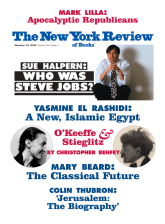In response to:
How to Dispel Your Illusions from the December 22, 2011 issue
To the Editors:
Freeman Dyson’s generous review of Thinking, Fast and Slow [NYR, December 22, 2011] greatly overstates my role in the story of scientific psychology. My discipline is indeed much more scientific than it was when William James and Sigmund Freud wrote their masterpieces, but the transformation was well underway long before I was born. The science of psychology grew in several stages in the twentieth century, from the schools of Gestalt psychology and behaviorism that I learned about as a graduate student around 1960, on to the cognitive revolution that was reshaping the intellectual landscape when Amos Tversky and I began our collaboration at the end of that decade, and from there to the developments in neuroscience and in the study of associative and emotional processes that attract many of the best graduate students of today.
Tversky and I were participants in the cognitive revolution, to which we initially contributed the idea that significant errors of intuitive judgment can arise from the mechanism of cognition, rather than from wishful thinking or other emotional distortions. We also had a glimmer of what later became the two-system idea. Our first joint paper, which documented mistakes in the statistical decisions of researchers, informally distinguished intuitive judgment from deliberate computation. The detailed study of contrasts between automatic and controlled processes began some years later in an Indiana laboratory, and many psychologists have refined and extended that distinction in the intervening decades. In my recent attempt to describe the interactions between fast intuitive thinking and the deliberate self, I draw both on the work of these predecessors and on recent advances in the study of associative memory.
Scientists operate mostly in disciplinary silos, and it is rare for research in one field to influence work in other disciplines. My research with Tversky crossed some of these boundaries, in large part because of our use of demonstrations that were accessible to everyone: we engaged readers in simple problems in which they could observe errors in their own intuitions. Our work has therefore been more visible to outsiders than many other advances in psychological research, but it is best seen as a contribution to the thriving collective enterprise of modern experimental psychology.
Daniel Kahneman
Professor Emeritus
Princeton University
Princeton, New Jersey
Freeman Dyson replies:
I am glad to have my errors corrected by Daniel Kahneman, who knows far more about the history of psychology than I do.
This Issue
January 12, 2012
Do the Classics Have a Future?
Convenience
Republicans for Revolution



